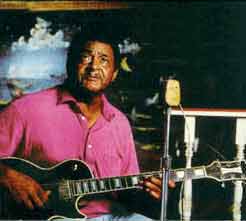
David "Junior" Kimbrough
| David "Junior" Kimbrough was born near Hudsonville, Mississippi on July 28, 1930. Junior came from a family of musicians. He started playing the guitar as a youngster and eventually came up with his own style of the blues. It was called "a mixture of bluegrass and Delta blues."(Living Blues (LB) May/June 1998) Others have commented that his music had a "West African feel."(LB May/ June 1998) Ethnomusicologist Slyvester Oliver wrote: "The patterns played by the bass and drums are an extension of Kimbroughās playing, which is organized much like that of an African master drummer." (LB May/ June 1998) Robert Palmer once commented that Juniorās guitar playing often sounded like a field holler, a musical expression during slavery. |  |
Above all Juniorās blues pleased the dancers who gathered at the house parties and juke joints he ran in Marshall County, Mississippi, for close to 40 years. The synergy between Juniorās grove and the beer-and-moonshine-fueled moves and shouts of dancers had the capacity to turn his club into one big churning force. (LB May/ June1998)
Juniorās music was wed to the places in which he played. "Kimbroughās music was inextricably linked to those fans and places in which he played". (LB May/ June1998)
Junior only made a handful of recordings. He recorded three of his own albums for Fat Possum records "All Night Long" (1992) "Sad Days Lonely Nights" (1993) "Things havenāt worked out" (1997). The majority of these albums were recorded in Juniorās juke joint, preserving the relationship between his music and space. His recording for Atlantic Record on the Soundtrack to the movie "Deep Blues"(1991) was recorded in his juke as well.
Junior played throughout Europe in the 1980ās. In the 1990ās funk and rock crept into his music giving
it a harder edge. He even opened for Iggy Pop in 1996. Even though Junior toured the heart and soul of his music
was still found in his juke joint. His juke joints joined those who might never met in different circumstances.
"At Juniorās one could find a white sorority girl from Ole Miss dancing with a middle-aged black man still
in his work clothes"(LB 1998)
 |
 |